[List of links at the end of transcript]
This episode is going to be more of a monologue. Every 4th episode is a chance for me to dig a little deeper into ideas that have come up in the interviews as well as insights from my own experiences - basically, anything that I think would be useful or instructive to anyone broadly interested in conservation. Today, I want to talk about power and empowerment in conservation in Myanmar.
It's the 2nd of 3 episodes focusing on Myanmar. Last week we were with Thanda Ko Gyi from Myanmar Ocean Project, and next week we will be with Yin Yin Htay from Myanmar Coastal Conservation Lab. Not only did I learn so much from my time in Myanmar, but, more significantly, it's a country going through an atrocious and brutal military regime. This is affecting people in countless ways across different sectors, including conservation and my friends there who work in conservation. And I want to amplify the impressive work that people are still doing on the ground there in the face of highly challenging, traumatizing conditions.
You’ll also learn about how the podcast's song, the Green Touch by Soe Moe Thwin, Zyan Htet, and Min Min came to be!
A reminder: while I genuinely appreciate you listening (or reading the transcripts), I would really love it if you could take another step and like, share, and comment- basically, to help get the messages out that this podcast is sharing.
So: power and empowerment in conservation. Power is so important to consider in pretty much any process involving humans. Whenever you're having interactions between different groups of people, and even within the same group of people, there are going to be power dynamics at play. And conservation isn't just about saving cute, fuzzy animals. It is really about control over resources. Power plays into who is in a position to make decisions about that access, who's in a position to implement and enforce that (and in what ways), and who benefits from those decisions and who is harmed.
Power is so important to think about. It's easy to lose sight about the nuances of power dynamics when you're an outsider to a situation, and also if you're in a position of relative privilege regarding power. It's much easier to see, from the other side, if you are disadvantaged, the barriers blocking you from fair and equal treatment and participation than if you are someone who already enjoys access to those things and might take them for granted.
Empowerment, in the way I'm using it, is the process of facilitating people's access to their agency and autonomy. This involves strategically and thoughtfully providing skills and resources, and helping to change structures, so that more people can access their power and use it in ways that match their needs and their own decisions and priorities.
It's important, when we're talking about "empowerment" or "capacity building", that we avoid having a savior complex about it and not suggest that it's up to some benevolent external actor to bestow power upon people. I do know some community organizers who don't love that connotation. So when I'm using "empowerment," it's in the sense of facilitating and then taking a step back and letting people do what they deem fit with the skills and information that they can now access and use.
Myanmar is a particularly important case study in power in conservation. For those who might not be familiar with the country's history, it was shut off from the world for decades and ruled by an authoritarian government. And yet during those decades, there were large international conservation non-government organizations (NGOs) operating in the country. So sit with that a bit. This is a country with not a whole lot of international involvement, and yet there are international conservation groups operating on the ground. I am certainly not attributing malicious intent to these groups - I'm not personally familiar with who was working there at the time or what their agendas were - but whenever a conservation group is working to set land and the resources on that land aside for conservation, that is taking the land away from somebody. And in Myanmar, that "somebody" has happened to be ethnic groups who oppose the authoritarian government. So we have a situation where conservation groups have been complicit in helping an authoritarian government land grab away from ethnic groups. Not a particularly admirable outcome to be involved with!
For this reason, in many parts of the country, large international conservation organizations are viewed with a lot of distrust. They're really not welcome there. Thankfully, in the marine realm where I work, there's not quite that history - marine conservation has lagged behind terrestrial conservation - so there's less of a context of mistrust.
Anyone coming into any place where there's a history like that needs to be mindful of the harmful legacy left by actions and actors that came before them.
So let's listen to a clip from the song "The Green Touch," and then I'll take you on a little tour of the Gulf of Mottama in Myanmar.
[MUSIC]
So, let's travel, in our minds, to the Gulf of Mottama. If you look at a map of Myanmar, it's where the country has a big indentation in its coastline. It's this expanse of mudflats and muddy waters, fed by 4 major rivers. It's home to the largest mudflats in Southeast Asia. And maybe you're thinking, "Okay, mudflats. Great. Mud."
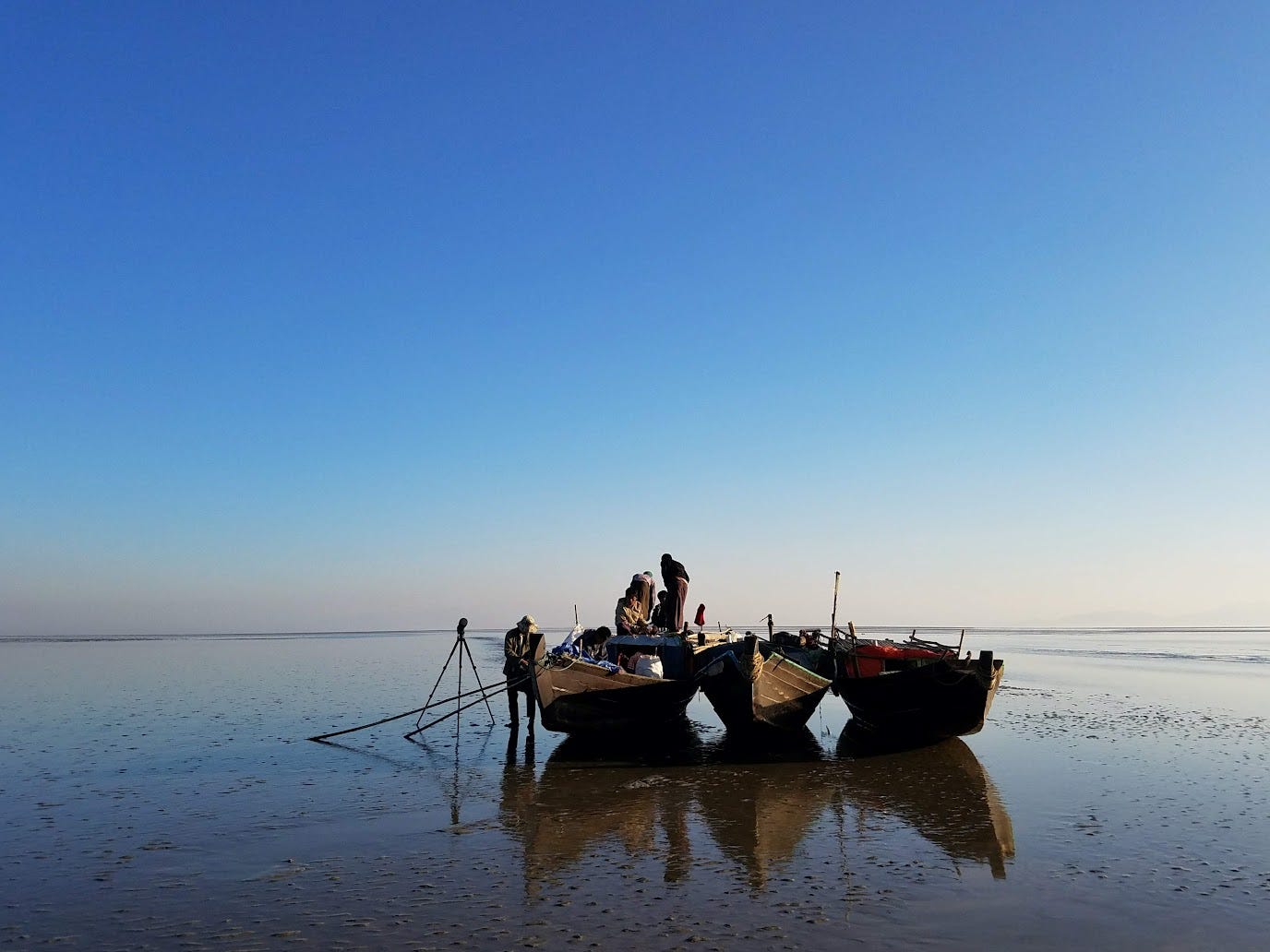
But we need to appreciate the mud. This mud is the foundation a productive ecosystem with valuable sources of food for migratory shorebirds and other waterbirds, who feed on invertebrates in the mud. This includes critically endangered, endangered, and threatened shorebird species, like the Spoon-Billed Sandpiper. Invertebrates in the benthos are also food for (and thus the foundation of) fisheries in the area that are important for local people's consumption as well as for markets. There are also Irrawaddy dolphins, finless porpoises, and humpback dolphins frolicking along the coast. There are sea turtles (and I had never known before that sea turtles can indeed live in muddy water areas - I want to thank my sea turtle researcher friends for correcting me on that). There are sharks and rays. There are mangroves areas that, while not extensive in the Gulf, they are locally important to the villages who live nearby.
And the villages of the Gulf are peopled by communities who rely on fishing and farming for their livelihoods, and in cases where it's hard for them to make a living off of these sources, they migrate to big cities or other countries to seek work. These villages are often quite remote and hard to get to. Whatever roads they are able to fashion in dry season get washed out during the rainy season.
Let's imagine that you see two motorbikes driving along this terrain. Between rice fields, scattered villages, along expanses of dried mud, going through stream beds where the water is mostly gone but there's still a substantial layer of thick, slippery mud. On one of those motorbikes is my field assistant at the time, Wint Hte, and the guy who's driving him. On the other motorbike is me, being driven by another collaborator.
This is one of my first visits to Myanmar, and my first exposure to fieldwork in the Gulf of Mottama. The guy driving my motorbike turns his helmeted head toward me and shouts: "You know, Myanmar is not a poor country. We are so rich in resources. It's our government that keeps us poor."
And that resounded with me. That's a wonderful encapsulation of the importance of power and who controls access to natural resources.
This particular motorbike trip was during my postdoctoral research. I was really interested in how communities are able to be stewards of their own resources. What are the power structures at play? What are the skill and capacity needs that communities have to be able to carry out monitoring and management of their resources? What are the more intangible things that allow communities to be able to do this successfully and effectively in the long term, and what are things that act as obstacles along the way?
Myanmar was an interesting place to look at this, because in the mid-2010s (when I started visiting there), it was undergoing a process of decentralizing its fisheries management. Being an authoritarian country, everything was going through the central government. But in the 2010s, fisheries management was being delegated more to the states and regions, giving them more control over their fisheries. This was a really exciting step! It also made community involvement and community rights in managing fisheries seem that much more approachable when you're bringing that power away from being totally concentrated in the central government.
I was lucky to be linked to the group Point B Design + Training, a fantastic organization that uses a Design Thinking approach. Design Thinking is basically, a participatory, collaborative, co-creation approach of developing projects and solutions for problems alongside the people who are going to use those solutions. They use this approach in their projects related to education and community needs, and they were interested in branching out to environmental issues.
I'd already been interested in Design Thinking for a little while; I'd really been interested in visiting Myanmar, which despite my working for years in Southeast Asia, I'd still never visited; and the context of the country happened to align nicely with my research interests. So it worked out great!
I went there and worked with 3 of Point B's alumni from their youth Design Thinking training program as field assistants. None of these youths had experience with conservation, but they were so good at engaging with communities and understanding how to respectfully and responsibly collect information from community members. These three young people are Wint Hte, Aung Naing Soe, and Yin Yin Htay.
They were actually so motivated by what they learned, just from participating in my research, that they formed the Myanmar Coastal Conservation Lab (MCCL) as a group within Point B. This is a local youth-led marine conservation group. It was never my intention to encourage them to form such a group - I certainly wanted them to leave their experience with me having developed useful skills and learned more about conservation, but they took that experience and made magic with it.
This happened relatively early in my time working in Myanmar, and it was the first of several instances where I saw people who had an underlying passion and interest really flourish when provided with strategic and thoughtfully delivered skills and resources. And they took those inputs and created something fantastic out of it. They were empowered - able to better access their power - to realize their own ideas and visions and dreams.
Also during my postdoc, I partnered with the Gulf of Mottama Project (GoMP). It's a multi-sector project (supported by the Swiss Agency for Development and Cooperation, SDC) with Network Activities Group (NAG), a local organization with a lot of experience working on fisheries governance and empowering and engaging with fishing communities. There's also Helvetas, a Swiss-based international organization working on development and with a lot of expertise in developing diversified livelihoods as well as disaster risk management and water, health, and sanitation issues. And there's International Union for Conservation of Nature (IUCN), responsible for the natural resource management and biodiversity conservation components of the project. They let me do my research in some of their project villages, and then I ended up getting hired by IUCN to help them implement their project components on the ground.
The GoMP was aiming to strengthen the sustainability and resilience of the ecosystems and communities in the Gulf. This was an exciting project to be a part of. I got learn from colleagues who had the expertise and connections to work with politicians on how to draft policies related to natural resource management, in this context of Myanmar decentralizing its fisheries management. I got to work with people with people who had expertise in working with communities and organizing them and helping them develop the Village Development Committees (VDCs), which were the focal points for coordinating activities within the village and representing village concerns at higher levels, at township level committees and entities.
The ideas of power and empowerment were interwoven throughout the project's planning as well as what actually happened on the ground. Helping to set up structures and capacity for co-management - so a partnership between communities, government, and other stakeholders - in a place where this has not been the mode of management involves a lot of consideration of underlying power structures and what kinds of power structures are desirable and feasible in the future.
In dealing with the government, there are a lot of power dynamics. Not only are different ministries and departments not accustomed to collaborating with each other, which is really necessary if you're trying to manage, say, a mangrove forest, which would fall under the Forest Department, but is also important for the Department of Fisheries because mangroves are really important nurseries for fisheries, and then there's also the General Administration Department (GAD) which kind of has, in reality, the final say in what happens to land allocation. If those entities aren't collaborating, and if there's a power imbalance between them, what emerges in practice is not necessarily going to be what's best for sustainability.
There's the reality that a lot of these ministries and departments, as in many other countries, have the power mandated to them to manage resources, and they don't have the capacity to do so. They are under-resourced - not enough personnel, not enough funding, not enough training. Yet those who are on the ground - the community members - who might be better suited to conduct monitoring because they are there, where the problems are happening, they don't have power to do anything about it. And of course they often need capacity support as well in terms of building their skills and funding.
Another power dynamic that's relevant in the Gulf, and sadly too many other places, is power held by private sector actors who are not engaging in sustainable or even legal practices. In the Gulf, this takes the form of illegal fishing using stake nets with really fine mesh stretched out for kilometers. They are extremely damaging to local fisheries because they catch everything, including a lot of juveniles. These are linked to business interests in one of the relatively large cities in the Gulf. Similarly, moneyed private interests seem to have an advantage in decision-making over what happens to mangrove habitats, which are often given to them to turn into agricultural fields to the detriment of communities who benefit from mangroves.
At the same time, there are responsible private sector actors who collaborate with the GoMP and have been a real asset and contributor to shaping fisheries management in the area.
When we're looking at a project that involves interventions related to livelihood, it's important to consider who benefits from those interventions and who doesn't. Similarly, when we're talking about those Village Development Committees: who gets chosen to be on those committees, and who gets left out? How are people chosen? Are those people representative of the community?
In many cases, the most marginalized are probably the least likely to be involved in a committee like that. They probably don't have as much time because maybe they need to work longer hours to make a living. Maybe they're already marginalized so they don't feel comfortable in mixed spaces. This isn't so much the case in the Gulf of Mottama, but in other parts of the country: maybe there's a language barrier. Maybe the marginalized group doesn't speak the same language as the majority does.
So you can go into a community and empower it as a whole, but still make some of these power imbalances worse. Some of the marginalized folks in the community might end up being worse off! And when you are playing around with power dynamics - let's say you're encouraging more women to be involved in these committees - that can have some pretty serious ramifications. In some of our interviews evaluating the project's impacts on communities, some of the women said, "I really appreciate that I feel more empowered to contribute to my community, but at the beginning my husband would get angry that I was no longer focusing on my household duties alone, and we would get in fights or we almost got divorced or he would beat me." That's... not good. This is something that most people working on gender in conservation have probably encountered.
So you need to respect that power dynamics that are in place, even if they are harmful, you can't come in and expect to switch them easily and smoothly right away. It's a process.
On the whole, it seems that GoMP has done a great job of empowering the communities with which it's worked. I know this because I helped implement a qualitative project evaluation method called Most Significant Change, where we collect stories from community members on how the project has impacted their lives. This is a participatory process in that the community members tell us what they want us to assess - the topics, areas, domains where they want us to see what changes have occurred. That is also a way of sharing power, of the community being able to say, "You might be this outside project that has a lot of funding and influence, but we're the ones you're working for, and we want you to see how you're doing along these metrics that are important to us."
And I was so impressed with the quality and richness of information we got from people's stories. Even though a lot of the domains they asked us to evaluated might seem fairly cut-and-dried, like we want to know about impacts to our livelihoods and technical skills, a thread throughout most of the stories were those more intangible things of people feeling more confident. That was reported a lot: I feel more confident in my abilities to earn a better livelihood, to shape my future, in being able to be a leader in my community, in being able to communicate with people, in being able to represent my community to the government. This was something that was so wonderful to see - as people were sharing their stories, just the obvious pride emanating from them as they were sharing these meaningful impacts.
The significance of confidence also shone through very clearly in another area of my work, which was to develop a functional and sustainable research and conservation training program. GoMP was originally going to give small research grants to local university research teams to conduct management-relevant research. It became clear that a lot of these teams didn't have the capacity to conduct the caliber of research needed for this, but they were eager to learn. My job became: how do we build capacity in a meaningful way for this kind of research?
And when we're talking about research, that's also power: the ability to collect, synthesize, and share information is a form of power. We want people to be able to do this on the ground, where there are, and not have to rely on some external party, some external consultant to come in and do it for them.
Speaking of power dynamics, anyone who's worked at a university can probably relate the fact that there were a lot of power dynamics at play in the universities with which we partnered. It made it difficult to focus on faculty as the target participants of this training program. They were overworked, underpaid, and often transferred to other universities. And internal politics and drama made it hard for me to know that I'd have a consistent cohort of people attending a set number of trainings. So I couldn't really track their progress of time.
There was someone else who was working in a similar position - with another university and another organization in Myanmar - and they ended up quitting because it was so impossible to get anything meaningful done.
I was able to work with Point B, and subcontract them into the GoMP, and we developed a training program that really focused on students - building the capacity of bachelor's students, Master's students, as well as recent graduates. And we came up with what I call a "pyramid scheme for good." I realized I couldn't be the one delivering all the trainings myself. That was not sustainable in any sense of the word. So I started off by draining the core team - the dream team - of Wint Hte, Yin Yin, Aung Naing Soe - in not only the content of the training, but also how to deliver the trainings. They and the two recent graduate interns would receive this intensive coaching, then we would co-teach those same trainings to the university interns. As they gained more experience teaching a given training, I would fade out my involvement until they were able to teach autonomously. Then they were able to train some of the university interns to then deliver that training in future years. It was a trickle-down effect that actually worked!
It was fantastic to see these young people absolutely blossom and take the resources and skills that were shared with them and make so much more of them. For example, the Most Significant Change evaluation method that I mentioned earlier: I was in charge of developing that and applying it to the Gulf of Mottama context and overseeing the initial implementation, but MCCL now conducts that work on their own. I just help here and there with analysis and report writing, but Yin Yin has learned not only to do this approach herself, but to train other youths to conduct this evaluation research. Through a similar process, MCCL has gotten to a point where they are running a number of different activities related to conservation and community engagement in the Gulf.
What I really want to emphasize here is, again, the idea of confidence. At the end of each cohort of interns, we had them fill out a questionnaire evaluating their experience with the program, basically asking how have your skills changed (if at all) for topics XYZ, etc. Several of our interns in the first batch wrote in the "other" section - they wrote in - "confidence. I feel more confident." How wonderful is that - not only that they feel more confident, but it was noticeable enough that they wanted to write that down in their evaluation!
And I could see it. It was so amazing to see these young people blossom in confidence and to see how much that accelerated their ability to apply other things that they learned. So as we're designing anything to do with empowerment or capacity building, it's important to think beyond the nuts and bolts of "we're going to teach them XYZ technical skills" and also pay attention to: are we really doing as much as we can to foster a sense of confidence?
On that note: two approaches that really allowed us to be an effective program, and that I've used effectively in my consulting work since, are (1) teaching people how to teach, and (2) teaching people how to learn. Like confidence, those are 2 skills that are cross-cutting and will amplify anything that people are able to with additional skills and resources that are provided to them.
So teaching people how to teach was the pyramid scheme that we came up with - we empowered young people to teach each other and to teach others without having to wait for an external party to come in and be responsible for that. Learning how to learn is something that we encouraged and fostered through the structure of our program. I knew there was no way I could train people who'd been through a restrictive education system in the same way I'd been trained over many (maybe too many) years of education. So I wanted to strip it down to how could we most effectively and efficiently empower these young researchers to be the best researchers they can be?
We identified 3 pillars - 3 mindsets: (1) mindfulness, (2) critical thinking, and (3) systems thinking. Systems thinking - you'll hear more about that in this series - it's the idea of understanding the different components and interactions between them in any system where you're working. If we're talking about fisheries, it's the fish, the fishers, the communities, the markets, the habitats, climate change, other impacts that might be harming the fish, so on and so forth. These 3 pillars guided how we taught any of our trainings. We introduced them to the basics to develop their skills in those pillars, and each subsequent training - even if it was a fairly specific skill that we were teaching - we emphasized how it connect to the ideas of mindfulness, critical thinking, and systems thinking. We helped create a structure into which they could fit anything that they learned and have it make sense in a systematic way.
I noticed that our participants became better learners. This is something that's going to help them no matter what field they're in, no matter what future trainings they're in, it's going to help them be more informed and thoughtful citizens and decision-makers. That's huge.
On the topic of the power of information and access to information, I want to talk about the last activity that I coordinated while I was still working in-country. It's near and dear to my heart: the Research Symposium for Stakeholders that we put on. Unfortunately, sharing research with stakeholders meant long days of endless PowerPoint slides of data without much context and without much explanation for the implications of those data. I had tried to tweak that over my time with IUCN - I'd tried to make stakeholder consultations about research more interactive, and that had succeeded. But for this final activity, I really wanted to create a space where people could meaningfully talk about the research they were doing, and stakeholder could give them feedback face-to-face without having to wait for a too-brief and very formal Q&A session.
We decided to do a set of interactive poster sessions. Each of the research teams had to make a poster, and we taught them how to come up with key points to distill and present in a poster, and we taught them how to make posters. And I want to give a shout-out to Carlito and Alice from Environmental Defense Fund (EDF) at the time, who made great contributions to this training on posters and shared examples from some of EDF's projects around the world with our participants. It was fantastic.
We had these poster sessions where stakeholders could wander around, talk face-to-face with researchers, and researchers could explain their research and focus on the important points directly with those people for whom that research would have significance. We had community members, government representatives, private sector people, as well as lay people from the city of Mawlamyine, coming by and really engaging in these lively discussions. Then we had breakout groups where people could discuss more specific, focused topics in between each of the poster sessions.
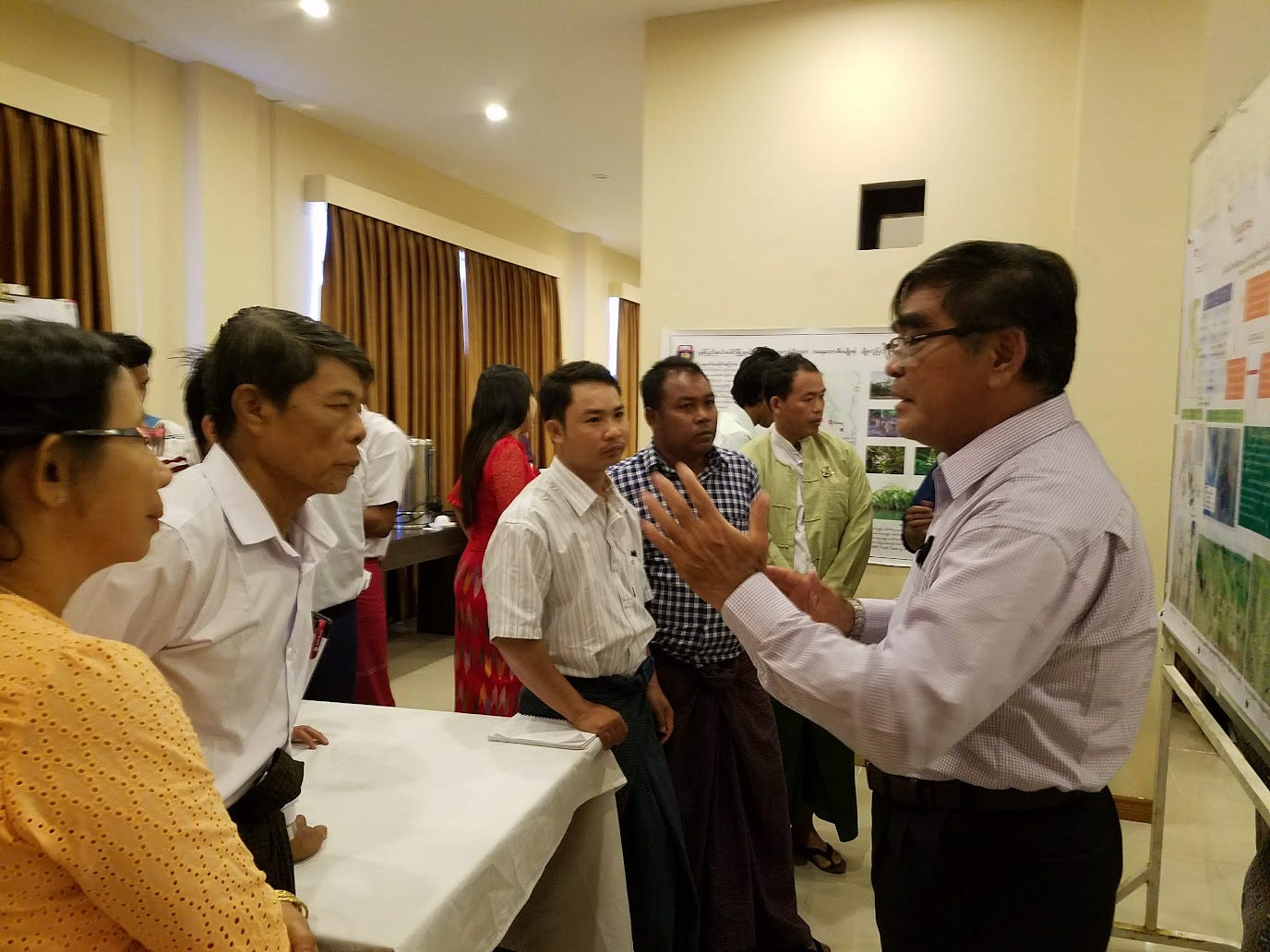
It was a hit! It was really well-received. We had to scramble to find extra chairs in the hotel to accommodate everyone who showed up. There were requests to repeat this on a yearly basis. Unfortunately, COVID19 happened a few months later, and the coup happened a year after that.
But I'm so thrilled with how that event went. Sharing information in an accessible way and in a way that people can provide feedback on is sharing power.
I could go more at length into my experiences with the GoMP, but I'm surprised at how long this monologue is already. I will say that at the Symposium, I was assisted by a wonderful young translator who was also an alumni from the Point B Design Thinking program, and that is Soe Moe Thwin. We became friends on Facebook, and I learned through Facebook that he is a really talented musician. And that's how the song "The Green Touch" for this podcast came to be.
His music really reminds me of strolling around the streets of Mawlamyine City, where I was based, or Yangon or other places that I visited in Myanmar, and often hearing young people hanging out and playing guitar and singing in this beautiful style. It brings back nice feelings of being in that place, making a difference and yes, being overworked and burned out, but also feeling very fulfilled in what I was doing, as well as appreciating the beauty of young people are able to do and create. So it's very special to me that he and his collaborators were able to make this song for this podcast.
To be honest, working in Myanmar was not the easiest as a foreigner. I was restricted in where I could go, it was really hard for me to get permission to stay overnight in villages where I was conducting research - unlike anywhere else where I've worked. I was working really hard, I definitely burned out. I lost my father - he passed away while I was working there, though I was able to go home to be by his side. Going through that grieving period was really tough.
But I learned so much from my time in Myanmar, way more than I could fit in an extended monologue. It really means a lot to me, the work I was able to do and the people I was able to meet and the things I was able to witness and learn. It was such an exciting time to work there. And one thing that I learned is that many of us who have the privilege and power of a lot of skills and knowledge and experience can really make a difference with the skills, knowledge, and experience that we possess. There's no need to have imposter syndrome. You can go somewhere where they need your skills, and you can help amplify the power of other people through sharing those skills. I really encourage those of you in these positions of relative privilege to think about what kind of mutual aid you can provide and how you can provide your skills in a way that's really useful and valuable on the ground - valuable beyond anything that you might be able to predict.
It's heart-wrenching to see what Myanmar's going through now. I fully acknowledge that I'm a foreigner, I don't live there anymore, I cannot imagine what it feels like to be from Myanmar and to be in the country watching all of this unfold. There are horrible atrocities being committed around the country.
One of our former interns, one of the brightest stars I've come across, was arrested for his part in student protests, and he was in prison for 6 months. Some of his peers, some of the students in his department were killed in the protests. Some of my favorite faculty to work with had to go into hiding. For a while, it seemed like everything we had built up with Point B and GoMP, at least in my area of work, it felt like it was being lost. That was tough to see. But what was the most difficult was to see my young colleagues feel like their futures had been taken from them. They got to grow into this time of flourishing in the mid-2010s and learn so much and be exposed to opportunities, and there was unprecedented access to the internet, and to feel this window of optimism and hope and opportunity suddenly shut on them is terrible.
At the same time, it's those young people, as well as my other colleagues who continue to do amazing work in Myanmar, who continue to give me hope not just for their country, but really help me stay optimistic about the state of the world in general. Their drive and dedication and strength in the face of this horrifying context astounds me.
Similar, community members who are really suffering from the double hit of COVID and the coup are still engaged and interested in managing their resources. I also need to add that a lot of my university colleagues in Myanmar have resigned from their positions, because the universities are government entities and so those faculty members who didn't want to support this military regime resigned as part of the Civil Disobedience Movement. They have faced serious repercussions for this. It's hard for them to find jobs that match their livelihood needs, qualifications, and experience. That's a really brave thing to do, and so many of them have done it. I don't know what else to do but say that I stand in solidarity with them, as little as that might mean from a practical standpoint.
This time of crisis underlines the fact that whenever we're trying to facilitate meaningful change somewhere, we need to do it in a way that is sustainable, in a way that can't be taken away by a regime change. Fostering confidence, teaching people how to teach, and teaching people how to learn are not things that are easily taken away by a military coup.
There's a lot to learn about power and empowerment in conservation in Myanmar beyond the Gulf of Mottama. I encourage everybody to Google the "Ridge to Reef" Project in Tanintharyi Region. This was a large project proposed by international organizations to set ~30% of the area in Protected Areas, which was successfully blocked by local environmental activist groups who'd had negative interactions with conservation organizations working with the central government in the past. That's a really instructive and powerful example.
I would also recommend looking up the Salween Peace Park, a fantastic example of an ethnic group running a conservation area effectively in a way that respects their rights, needs, traditions, and heritage. Also in 2017, the country's first Locally Managed Marine Areas (LMMAs) were declared in the Myeik Archipelago, also in Tanintharyi Region. Candidly, I don't know the status of these now, but it was an exciting step for marine conservation in Myanmar. And Fauna & Flora International played a large role in facilitating and organizing that alongside the communities. I recommend looking that up.
I did this episode a bit extemporaneously. I hope it was coherent and I hope that you learned something from it. Thank you so much for listening. Please pay attention to what's going on in Myanmar and to what our colleagues in Myanmar are doing, and please realize that you can make a difference with the skills and privilege that you have already. Thank you so much for listening, ကျေးဇူးတင်ပါတယ်!
LINKS:
Myanmar Coastal Conservation Lab (MCCL)
Gulf of Mottama Project (supported by the Swiss Agency for Development and Cooperation, SDC)

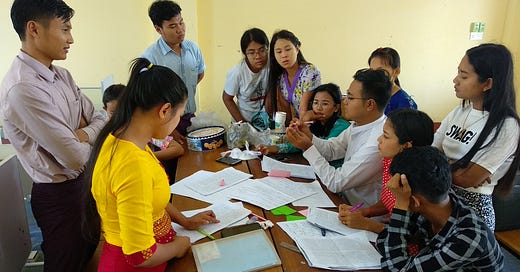



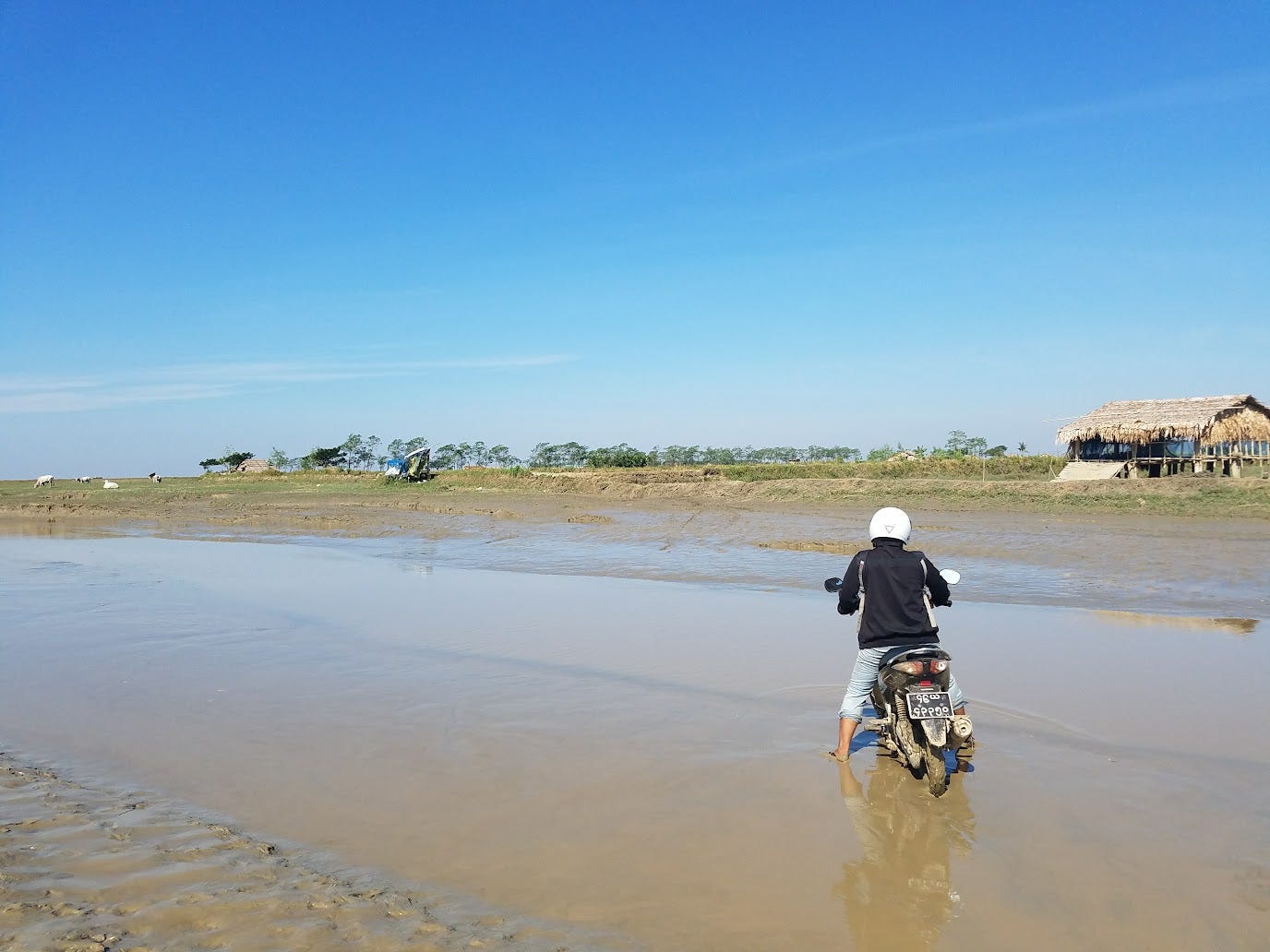
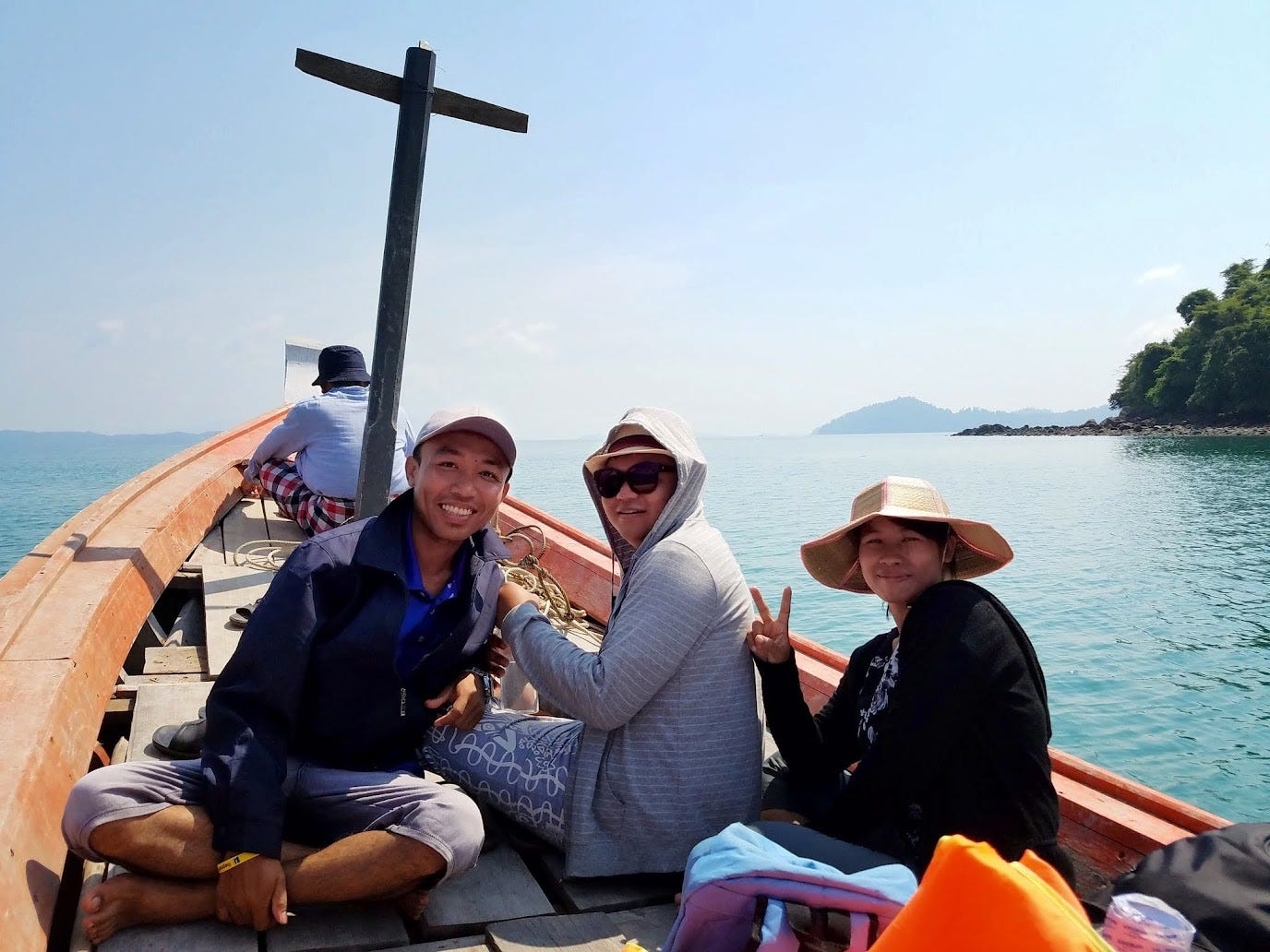
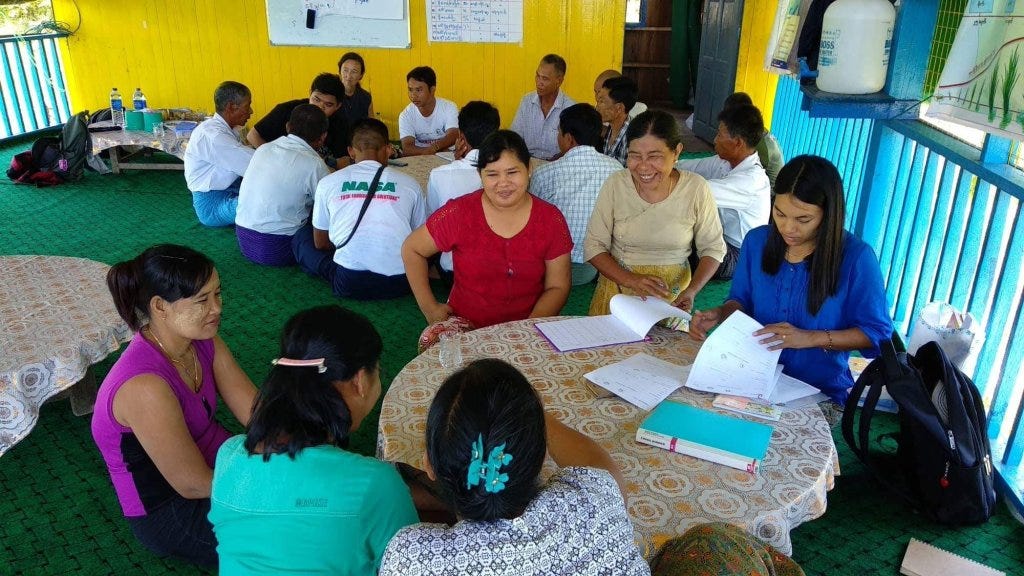




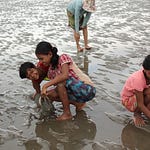

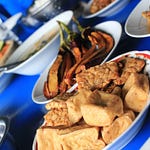
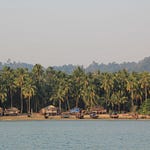
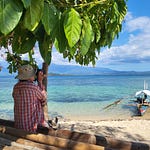
Share this post